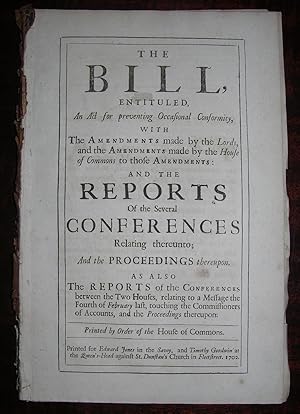Descripción
The Bill, entitled, An Act for Preventing Occasional Conformity, with The Amendments made by the Lords, and the amendments made by the House of commons to those Amendments: and the Reports of the Several Conferences Relating thereunto; And the Proceedings thereupon. As Also The Reports of the Conferences between the Two Houses, relating to a Message the Fourth of February last, touching the Commissioners of Accounts, and the Proceedings thereupon. Printed for Edward Jones in the Savoy, and Timothy Goodwin at the Queen's-Head against St. Dunstan's Church in Fleet Street, 1702. Folio (11 x 7 3/8 inches). 36-pages. Disbound. [WITH]: An Account of the Proceedings of the Lords Spiritual & Temporal In Parliament Assembled, In Relation to the Bill, intitled, An Act for Preventing Occasional Conformity. London: Printed by Charles Bill, and the Executrix of Thomas Newcomb, deceas'd; Printers to the Queens most Excellent Majesty, 1702. 28-pages [AND WITH]: MACKWORTH, Sir Humphrey (1657-1727). Peace at Home: or, a Vindication of the proceedings of the Honourable the House of commons, on teh Bill for Preventing Danger from Occasional Conformity. Shewing The Reasonableness and even Necessity of such a Bill, For the better Security of the Established Government, for Preserving the Publick peace both in Church and State, and for Quieting the Minds of Her majesty's Subjects. London: Printed by Freeman Collins, and are to be Sold by J. Nutt, near Stationers-Hall, 1703. [8], 12-pages. Second edition. Mackworth, and industrial entrepreneur and politician was politically "a tory who had been loyal to James II. His nomination for Cardiganshire by the Mine Adventurers in 1701 was typical of a trading concern's political ambitions. The adventurers were noted for their high-church toryism and Mackworth proved an assertive upholder of their principles and protestantism in parliament and through pamphlets. His loyalty to the Anglican church was marked by his support for the Occasional Conformity Bill in 1703, when he objected to toleration and defended the pre-eminence of the Commons over the Lords, and for the tack in 1704. He was suspected of promoting the controversial Memorial of the Church of England (1705), via William Shiers. His anti-whig and anti-court views led to his attacks on the king's ministers in 1701 and on Robert Harley as speaker in 1704 5. He was critical of the succession question and the Regency Bill of 1706" (William P. Griffith for DNB). The "bill against Occasional Conformity, first introduced in the Commons in December 1702, at the very beginning of the rule of Queen Anne, became one of the most controversial measures of that reign. It raised issues both of high principle how far should dissent and nonconformity in religious practice be allowed in a kingdom with a state church and low political and partisan calculation the Whigs benefited from the practice of occasional conformity and thus the Tories were anxious to place limits on its practice and benefits. "The measure passed through the Tory-dominated Commons with some ease at first, but faced stiff opposition in the Lords, where the Whigs had a slight edge. The Whigs in the Lords did not wish to risk a direct vote on the bill and its opponents instead added a series of wrecking amendments which they knew would sink the bill when it returned to the Commons. The climactic conference between the two houses took place on 16 Jan. 1703 in the Painted Chamber, which Bishop Burnet tells us was the most crowded upon that occasion that had ever been known . Following the conference the Lords held a series of very close divisions on whether to adhere to their amendments despite the Commons objections. The most offensive to the Commons was passed by only one vote, thus ensuring the bill s demise in the lower chamber when it was returned there on 1 February. "This was seen as a defeat for the Queen s Tory ministry, led by the Duke of Marlborough and Baron Godolphin. N° de ref. del artículo 72lib1285
Contactar al vendedor
Denunciar este artículo
![]()


